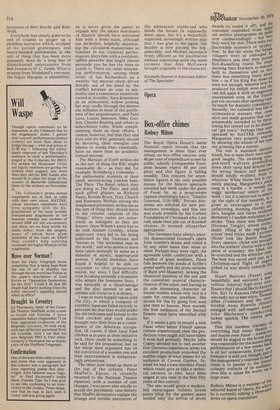Box-office chimes
Rodney Milnes
The Royal Opera House's latest financial report reveals that the management is more than ever reliant on box-office returns: only 46 per cent of expenditure is met by public subsidy (comparable European houses expect 60 per cent plus) and this figure is falling steadily. This concern for attendance figures is the only possible excuse for the bizarre spectacle unveiled last week under the guise of Faust by, as a programme caption charmingly has it, "Ghailes Gournod, 1118-1893." Private donations are solicited for new productions nowadays, and this one was made possible by the Corbett Foundation of Cincinnati who, I am told, made their pile out of doorbell chimes. It seemed altogether appropriate.
The Germans have always snootily disassociated Gounod's opera from Goethe's drama and called it by any other name that arose to mind. Perhaps they were right. An agreeable Gallic confection with a handful of good numbers, Faust falls between the stools of Scribe's grand opera and the proto-verismo of Bizet and Massenet, lacking the theatrical qualities of the one and the consistent musical characterisation of the other, and having as its sole interesting character an honest maiden whose only vice is a taste for costume jewellery. She atones for this by going first mad and then to heaven. How warmly the frail audiences of the Second Empire must have identified with her.
If it seems a pity to mount a new Faust when better French operas remain unperformed, then the production team might still have taken it even half seriously. Maybe John Copley decided not to risk another Don Giovanni experience, when his excellent production provoked the audible anger of what passes for an audience at Covent Garden. Instead we had a time-machine Faust which could, give or take a technical advance or two, have been staged at any time in the first fifty years of this century.
The sets would grace a moderately extravagant Golders Green panto (that for the garden scene needed only the arrival of seven
,The„
opecumor November 30, 1974 dwarfs to round it off), and the costumes resembled those faded old archive photographs we smile over condescendingly — but here they were for real. There were two discernible moments of ‘produc' tion.' In the fair scene the female villagers were so unhinged hY Mephisto's aria that they started bsKhoeutnhwshowing stthemselveshelel iirn gk h ircokuenr rod tdtuh eiuusdsi tetahagat eet there was something Nasty about him — as if his King Rat make-' were not enough; minutes later he cparostdufecl eiduphoisn hellish winewaoineeaagnedratehses unsurpassed even in the French pub ten seconds after opening tinoe. So much for dramatic con sistencY. Secondly,th statuary e caatthueary h cathedral that fcuallm/ ecclesiastical alive and made gestures that were presumably intended to be threaeteanl in,ggetbuytotuu,srn,erdeoruhtatpos bthe etyheatriwere operated by NATTKE stewards. Marguerite very properly reacted banyeshgroiwnnining gthlikee a whmiteamsoafe.her eYeS The rest is standard operatic kitsch, but at least there were smile dagoonwnodd-teltaehutehgirhsrw.aamitphzeehrassdwisgsthing eYessthheuuwrld oknighdtlyhearter-ediraenedtaralihnbc'—tliejoinn:ge wherever White Horse Inn is c°_,r, rently playing. Marguerite's jewel
soggy intellectualihatehlluereeltuleal re
— centre the of the wuportkh—e bs iugthi tt iosf blitse on000t eteoeste, tO gown as extravagant as it was unflattering, donning chunkY c°_,41" tiers, bangles and tiaras rendere' Bernstein's Candide redundant at 3 stroke. Then there was Mephist° (Norman Treigle), whose entltu; siastic rifling of the rag-bag Oac' iityoires tlior eodk t rl like ke s Buster L agueraetoucrie iEnvteorytheopseortdaiteicrscleihchoeruws awsitbhroaurgahr; sense of economy: the blind, the be-crutched and the stretcher ease' agseies -acsarsdavflediguhnttiluflasatu, jerked its way slowly towards the Stuart Burrows (Faust) sang beautifully, and executed a tnar" vellous tenorial high-note exit' flounce that !should like to have °11., film. Kin Te Kanawa (Marguerite/ was sadly not in best voice. Thomas Allen (Valentine) and the .everi; elomvearbgedle Anne Howells (Stebet" lacked sparkle. The chorus sang flies. Stuart Christmas-card aws everything that music of lJuoshonl y Matheson's w ith s e1 That this heedless travesty theatre,. _ -resepoenctd 1.1cIttai ncg and maybe even Faust — stands 1m. should be staged in the house the` was responsible for the superb sing performances of a few weeks bac„ is all but unbelievable. Ever)' Pjelif formance is sold out, though, en°,.,4 the management's response t°1191"-t icaurIi times is to pander to ne
the lowe;,
then this is cause for worrY on g times is to pander to ne then this is cause for worrY on g astYcalein.stincts of its auclieric a the eRdoclitonrieaylMboiteds oisf Oa pneenira, bf:rr w°1hierth sheeriisescounrreopnet riyaetrdaitrii snig a atiotrih reea -P










































 Previous page
Previous page